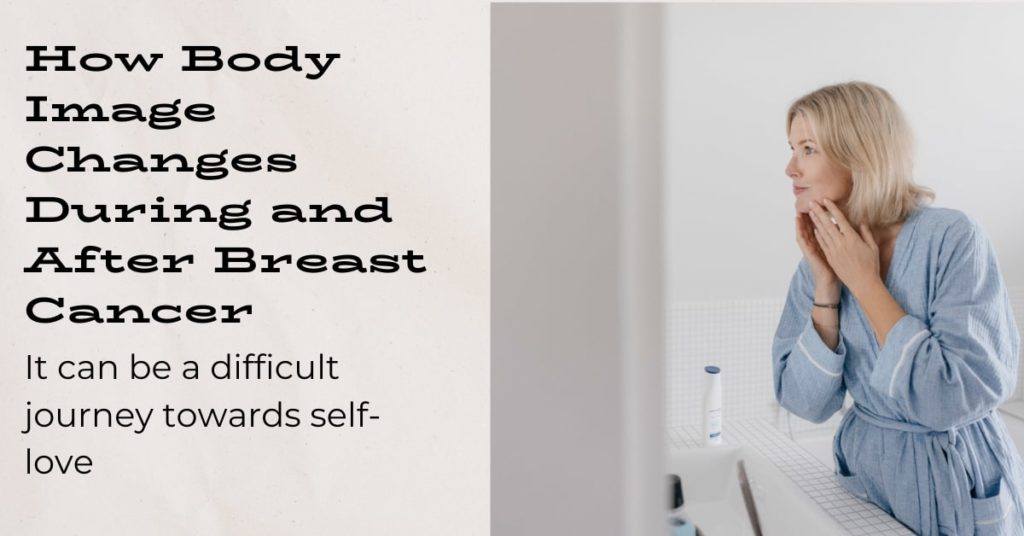Many people think of cancer patients and survivors as extraordinarily brave in the face of their diagnosis. Still, not many consider the psychological toll of going through the difficulties of treatment. For women with breast cancer, these feelings can be even more amplified; breast surgeries and hair loss can be traumatic experiences that affect womens’ self-esteem and overall mental health! Body image is already a struggle for most women, but struggling with body image after cancer is a unique challenge that shouldn’t be taken lightly.
Accepting the Realities of Breast Cancer Treatment
Without a doubt, accepting your body’s reactions to treatment is not easy. It’s important to become educated on each of these physical changes:
- Hair loss
- Skin color changes
- Weight loss from nausea
- Scars from surgery
- Weight gain from edema, lack of exercise, and fatigue
Sometimes, these effects just can’t be avoided and self esteem can suffer as a result. Many women express that they feel disfigured or unattractive.
Things to Keep In Mind About Your Body Image After Cancer
Firstly, it’s important to realize that the people around you who care may not think very deeply about emotional wellness when it comes to self esteem. For many who’ve never experienced cancer firsthand, they may figure that it’s an easy fix to simply cover your head or buy a wig when hair loss occurs.
Those who have been in that situation realize that it’s actually a traumatic experience. Many people who have a loved one with cancer may be prioritizing treatments, their cost, and helping their loved one keep hope in their effectiveness. Though, the dramatic changes that happen during this time can last a lifetime. A statistic from Johns Hopkins states that 88% of people who’ve had breast cancer say that it has negatively affected the way they feel about their body.
Keeping a negative body image after cancer can allow more serious problems to occur. Women who don’t feel attractive can withdraw from their partner, spouse, or the world of dating. Feeling bad about the way you look can lead to serious mental health crises like eating disorders, body dysmorphia, depression and anxiety. Younger women, especially, may suffer, since they may feel their youthful beauty has left as well.
The Power of Body Positivity
Luckily, the path to feeling better consists of making small changes in day-to-day life. First of all, it’s good to surround yourself with other survivors who take pride in their body as a symbol of strength and survivorship. Try repeating an affirmation to yourself in the mirror to work on reassuring that there are many ways of being beautiful. Affirmations work to undermine negative thoughts you have about yourself; they can be anything similar to:
- “I like my scars because they’re a symbol of winning the battle against cancer”
- “I think I look pretty in this wig/ with this hair color”
- “I may have gained some weight, but I know my body’s beauty comes from its strength.”
- “I’m excited to see my body after breast reconstruction.”
Sometimes, women can feel insincere telling themselves these phrases, but research done with MRI (magnetic resonance imaging) scans show that the “reward” center of the brain lights up with affirmations. They also target the medial prefrontal cortex and posterior cingulate, areas of the brain that concern “self-related processing”. This type of processing is crucial for handling painful emotions and situations.
Empowerment Through Community
For this, we recommend checking out this article to find out how you can find a community online– some over video chat. If you prefer in-person communities, nearby hospitals will often have programs where survivors can meet up.
One popular example of public service support, the Look Better, Feel Better Foundation has online resources and workshops to help you get through tough times. Cancercare and Cancer Support Community (CSC) are other public support organizations with connections to various groups and counseling. The key here is to build a sense of community with even just a few individuals who have gone through the same battles of poor body image after cancer.
Seek Professional Treatment
Healthline states that cognitive behavioral therapy (CBT) can work to reframe your attitude and thinking patterns that lead you to feeling bad about your body. A licensed professional can teach you how to veer away from self-criticism and use guided imagery to help relieve stress. You can also use this opportunity to talk about any triggers and memories that are associated with your body image after cancer. Finally, you may want to consider selective serotonin reuptake inhibitors (SSRIs) if your therapist or counselor thinks you may benefit from them.
Sometimes, taking the first step needed to heal emotionally after a cancer diagnosis is the most difficult part. Remember that facing mental health issues, even when it concerns body image, is worth addressing and getting help for. Now is the time to take back your confidence!
